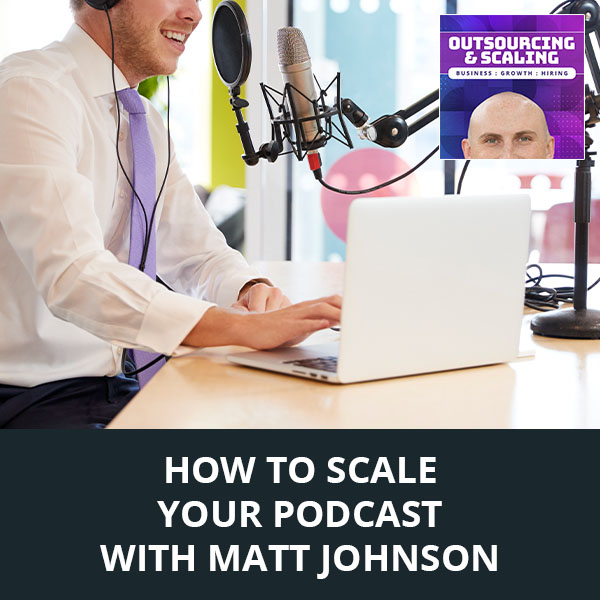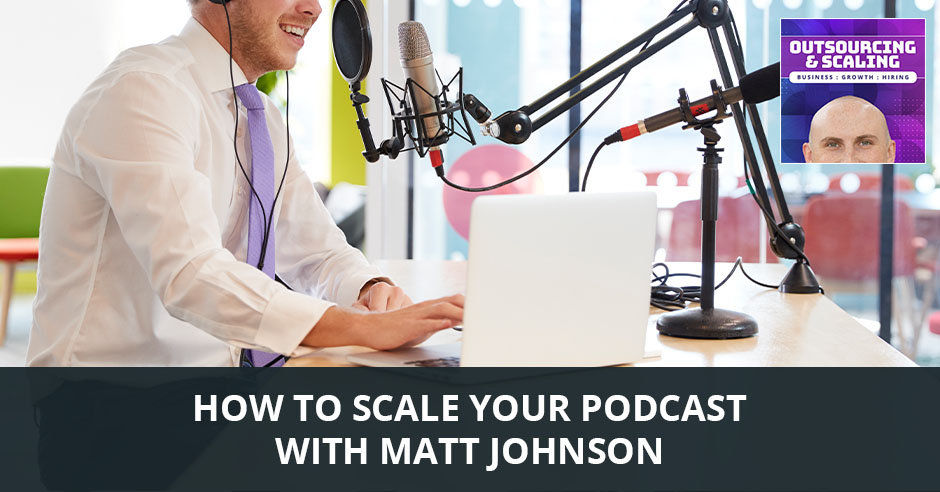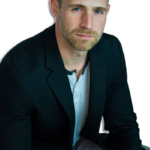


There is more to podcasting than merely talking about a niche, interviewing guests, and promoting brands. For Matt Johnson, the host of Real Estate Uncensored, podcasting is about delivering a compelling idea to an audience. He shares his expertise on how to deliver the right podcast pitch, get a show off the ground, be in other people’s shows, and come up with new things during episodes or talks. In this episode, Matt teaches on how you can start your own show – from conceptualizing your niche up to hiring your staff and training others to be featured in other people’s shows.
—
Listen to the podcast here:
[smart_track_player url=”https://www.podetize.com/statsapi/www.podetize.com/wp-content/uploads/fileuploads/11-5b145ef137b51b3d1af0633e9305c43d/10/2019/95ec676bba400a5a5d75ecb0a3c9ef7e.mp3″ title=”How To Scale Your Podcast with Matt Johnson” artist=”Nathan Hirsch” image=”https://freeup.net/wp-content/uploads/2019/04/OAS.png” ]
Download the audio file here.
How To Scale Your Podcast with Matt Johnson
I’m here with a friend of mine, Matt Johnson. Matt, how are you doing?
I’m doing awesome.
For those of you who don’t know Matt, he hosts niche business podcast such as Real Estate Uncensored and he launched Podcast Pitch Assistant training to help experts get pitched a podcast as consistently by their internal staff. He is a frequent podcast guest and event speaker. The audiences are around the US, Canada and Australia. Matt, I am excited to talk to you and about Podcast. Podcast has been a part of rescaling FreeUp and now having my own podcast. I am excited in digging into that, but first let’s take a gigantic step back. What were you like growing up? Were you a rebel? Were you a straight-A student? Did you always know you wanted to be an entrepreneur? Walk us through that story a little bit.
I didn’t know I wanted to be an entrepreneur. I didn’t flip that switch until I was in my mid-twenties. I grew up a pastor’s son and watched my dad pastor a church essentially by himself with an assistant. That’s where the entrepreneurial urge came from. I wanted the freedom and the independence I saw him have of just rolling into an office when he chose to at 6:30 in the morning and then being home with us by 2:00 in the afternoon every day. That was my first exposure to anything you could call entrepreneurial. I didn’t know anybody in my family that owned anything. I grew up in the wrong side of the tracks, on the wrong side of the river from Omaha, Nebraska so I had no frame of reference for business ownership at all. I didn’t flip that switch on my mid-twenties when I started a real estate team and realized that I wasn’t crazy about client stuff. I loved the marketing and team building.
Even back then, I immediately contracted with a freelancer to do the back-end operations work of our team rather than trying to learn it and doing it myself while selling. I knew that right away I didn’t want to do that part of it and found a good freelancer. That always have been my background and that led to working with my old agency which served that audience of real estate almost exclusively, at least when I was there. I helped them break out of that through podcasting, which is a whole other story. That’s how I made back to the real estate and podcasting world and that led me to starting my own show, which led me to start a podcast production agency and then becoming a new media strategist and all that fun stuff. That’s the back of the napping sketch of my background.
What was about team building that turned you on? A lot of entrepreneurs shy away from that.
When it comes to team building, in my background, I was always drawn to it and there was a lot of positive reinforcement around being a good leader and leadership. Think of marketing as a subset of leadership. When I think of someone who’s a thought leader, an expert, an influencer, even if you look at the Simon Sinek’s and the Gary Vaynerchuk’s of the world, they are not just marketing, just podcasting, just building companies. They’re leading a tribe of people in a certain direction, where they want them to go. That’s how I approach everything. I think of podcasting the same way. Podcasting is my platform to lead other leaders. That’s my goal in life is to raise up and lead other leaders. That’s how I feel like I get fulfillment and impact.

Let’s talk about podcasting a little bit. Talk about the first podcasting experience and why that became addicting to you. It has become a big community of podcasters making a difference in all these different niches around the world. What is it about podcasts that have helped entrepreneurs?
My first experience was doing live webinars with other influencers in initially the real estate space and that turned into me starting a show where I did the same thing. Some of my best friends are either my co-hosts from that show, people we’ve met on that show. They turned into collaborators and joint ventures and we started stuff together. It was an incredible relationship-building experience. The side effect of that is it also built up my authority from being a nobody in the industry to being a somebody, even nothing changed the fact that I was a podcaster. That was interesting in itself. It’s weird how you can have all the authority and all the knowledge and expertise in the world if you don’t share it. If you’re not visibly sharing it consistently, people don’t know that it’s there. You can be sharp, on point and super knowledgeable, but if you’re not out there publicly sharing it, people don’t know about it.
When you do start sharing it, people’s perception of you changes. I went through that and it was visceral. I went through it and saw how much it made a difference in my life. To me, that was one of the big things. The other big thing about podcasting is that because they are such interesting in-depth conversations. I love ideas and I love talking to sharp intelligent people who are also passionate about ideas that for me is what attracted me to podcasting and marketing in a way essential doing what I want to do, which is having cool conversations with cool people. Except I can use that to market and grow my business.
You’ve launched a few podcasts and had been on other podcasts. What’s that process like to get a podcast off the ground? What should people be thinking of? What kind of planning is involved in that?
It can seem overwhelming, but you do have to take a step-by-step. There is a lot to it and I would encourage anybody launching a podcast to do it in one of two ways. One, pay someone who knows what they’re doing to help you launch it so you could relax and focus on building buzz and being active on social media. That’s what we do with our clients and it freezes them up to have a bigger launch, because they are free to share and talk about the podcast and know that all of the rest of us have it taken care off. The other option is if you’re not quite ready to do that, you can definitely launch your own platform, but I would encourage you to do it in stages. What I did with my podcast way back in the day was I started doing Google Hangouts and they were live. We got a nice boost from YouTube back in the day, then three to four months in, I released it as a podcast. I flipped the switch and submitted it to iTunes and we started calling it a podcast. That’s my best advice to anyone, to start off on Facebook Live or do Zoom networking calls. Start small. Start in stages you can always turn it into a podcast later. The other place I would start is getting featured on other people’s podcasts before you go through all the work of trying to launch something yourself. Start getting featured first.
Let’s talk about being on other people’s podcasts. First of all, how does that help you as a business owner? Second, what kind of plan should you come up with to make sure you are getting in front of the right audience and you’re sharing information that people want to hear, consume, and follow?
One of the biggest challenges I see for every influencer, including myself, was we tend to find ourselves in an echo chamber. In other words, we tend to stick around in our same neighborhood, Facebook or Instagram as our cheers and everyone knows our name and that’s awesome. The problem is it leaves us to make a big mistake, which is we end up trying to find ways to say new things to the same people. Not a great way to sell and definitely not a great way to scale. You talk about scaling up the people that I know, especially the taught leaders who have scaled up. They don’t come up with new things to say to the same group of people. They’re saying the same things to new people. That was a big thing. I came across that years ago from the godfather of real estate coaching who said, “This industry turns over 50% to 70% every three years. I don’t need to say something new. I need to say the same things to new the people.”
Saying new things to the same people is not a great way to sell and scale.
That hit me hard. I went to podcasting, getting featured in people’s podcasts. It allows you to say the same things to new people. They get your message, your clear and compelling idea that you’re sharing razor sharp. It doesn’t happen without repetition. Getting featured gets you that repetition. You start getting better saying the same thing, but the same thing you’re saying gets more powerful, more clear and more compelling. The more you say it, the better it gets. The more effective, it gets you clients. When you get featured regularly and essentially you’re going to someone else’s neighborhood all the time, you’re constantly speaking to other people, you are giving them an opportunity to come in your world and bring them back to your blog, podcast, website or whatever your case is. You are constantly bringing people into your world. That to me solves that biggest challenge that an influencer has of trying to always come up with new things to say. We do not have to come up with new things to say.
Let’s take some listening out there. They have a message that they want to be an influencer. Where’s that starting point? How do you go about other people’s podcast?
Start with a research phase and find essentially every podcast that you can get your hands in in your industry and start with the audience’s perspective. That goes back to knowing who you want to serve and impact. You want to know who your ideal client, your ideal perspective is. Who is the person you are trying to lead and serve? If you know that, then you’ll start talking to them. Ask what podcast they’re listening to. “What are you listening to? What are you paying attention to?” If you have a question about something and you want to grow your business, where do you look? Sometimes you’ll hear a couple of things. While I listen to a podcast, I search some things on YouTube and buy business books. For the most part, it’s the same three answers. If you get out there, you start talking with the people you want to serve and impact and you pay attention to the podcast they are listening to. Those are the first ones you pitch. Those will lead you to the next crop, maybe the up-and-comers or the ones in a bigger niche or iTunes will recommend one of the sites. It is not that hard to build a list of 50 to 100 podcasters to reach.
As far as reaching out, you can find their contact info and reach out in LinkedIn or researching their site to find their email and send a short message. Something like this works great, “I stumbled across your podcast. I like that last episode with John Smith, it was great. I’ve heard of him and it was a great opportunity to get to know him better. Are you looking for a guest to talk about X, Y, Z? That’s what I love to share about. Let me know. I’m always open to opportunities to get featured and bring value to another audience.” If you reach out on your own in behalf of yourself, if it’s something that casual and the hook is right and it is a good hook for that audience, you’ll get a response. I would say three or four times out of ten, it is not 100%. The more you are known in that space and the more podcasts you go on, the more people get to hear about you and that goes up to eight or nine out of ten. It gets a lot easier and then it starts to flip. You’ll hit that tipping point where you don’t have to reach out that much anymore. You start getting invited.
How many pitches do you get in a week, Matt?
We produce about twenty shows. We get a pretty good number. We have relationships of varying degrees with all the interview podcast booking services. We are on everyone’s radar. We get a pretty good amount of pitches.
Give me the best pitch you’ve ever gotten versus one of the worst.

The best pitches always go like this, “I think we have a great guest for your show. Here’s why. Here’s what they talk about and we thought it would be a perfect fit for your audience because of X, Y, Z.” To me, that’s always the best. What they don’t do, and this is what we do in our outbound pitches that I think amplifies it and helps me get better results, is I always find an opportunity to name drop and mention mutual connection, preferably an actual mutual friend, somebody I know. That’s what the interview services are not great. They may be able to present someone else as good fit, but they rarely work on their relationship angle and that’s what I feel like we’re better at teaching people to do. The worst ones are, “I thought this person would be a good fit.” They talk about X, Y, Z and realize they have not researched the show at all. They don’t know what it’s about. They don’t know who our previous guests are. The most irritating thing is when you can tell they haven’t even so much pulled out your iTunes page to read the description of your show. All they did was look at the title of it and say, “Good enough.”
Any other tips on getting your podcasting career getting on bigger shows, getting in front of the right audience? I’ve been on podcasts that I thought they were going to be awesome. They get a lot of downloads, but it wasn’t my core audience for the business side and I got ones that are smaller. They might not get many downloads, but that’s my target people. How do you identify that to make sure you are maximizing your time?
My answer to that is don’t identify. You always want to be pitching every level of show all the time, big, small or medium. The way to do that is to have someone pitching you insistently so that you are not doing a bunch of homework on trying to identify that. It is nearly impossible to tell on the front size. Does this podcast have a big audience, small audience because they are super targeted, because they are new? You can’t tell that stuff until you go on the shows, so might as well go on the show. My point is always have someone pitching you two to three hours a week and insistently going on to interviews. A week will solve that problem. Let go of the mental burden of trying to figure out in advance and get out there and get exposure. What will happen is you’ll get on the big shows, you’ll figure out which ones hit and which ones don’t. You’ll get on the small shows and figure those out. You’ll hit that tipping point where you’ll start getting more invitations. You’ll start to pitch yourself and then you can start to cherry pick which invitations you take and start building on the relationships you have. All of the sudden, something big will hit.
One of my clients is a great example. Dana Malstaff runs Boss Mom and has a huge Facebook community of over 40,000 people. Little did she know, she got invited and pitched herself to go on Pat Flynn’s podcast, Smart Passive Income. It blew her brand up because she already had a good base and she can trace back six figures in direct revenue to that one podcast interview. How would you know she was also an entrepreneur on fire? It didn’t do much. She was featured on Forbes, didn’t do much. All these things that you think are either comparable to even bigger names did nothing. Pat Flynn was the perfect audience, perfect influencer to recommender you’ll never know going in when you’re going to stumble across that. When you do, just run with it, boost it, share it with everywhere on social media and build that relationship to keep coming back. That’s what she has done well with him. That’s my best advice. If you have someone pitching you, you don’t have to worry about that as much, just watch for when something hits and then lean in and capitalize.
You had a lot of guests. What makes a good guest or your podcast opposed to someone’s?
A couple of things. If you want to be a dream guest, be conversational. Don’t show up with this agenda that you have to get to your seventeen talking points or something is wrong. I hate that. One of the worst guests I ever had showed up intending to deliver his webinar. At one point, as the host, I didn’t talk for twenty minutes. Needless to say, I am not anxious to release that episode to my audience. Don’t do that. Be conversational. Understand that this is not always easy. It is a muscle that can be built. I am working on it myself which is to tell more stories than to just make statements and give facts. That example I gave, Dana is much more effective than me just telling you, “It’s much better to pitch yourself everywhere all the time because you don’t know what’s going to hit.” It drives the point home to give an actual story, that’s a success story or a visceral vivid example of what you are saying. Before you go on shows, it helps to sit down and look at the things you want to share and ask yourself, “Do I have a story? Is there a story of someone in my world that I could share that illustrates this point better than me just making a statement?”
Does it make sense to have some go-to stories in your back pocket or are you just thinking of them on the spot?
When podcasting, it is important to have a clear and compelling idea to give clarity to people about what your message is about.
It is better to have them in your pocket to refine them a little bit and they get better, more effective and razor sharp over time. The pros have their stories. They’ve got it down and as a podcaster, you start to be able to notice. The audience might not able to tell, but I can tell as a host when someone has their stories laid down and it’s good they know what they’re doing. My challenge is to throw them off and get them to share something more than they weren’t planning to.
What else should people know about podcast, the podcast industry, scaling your business using podcast?
I had a great call with a guy, a friend of a friend. He works for my old mentor at my old agency and he was asking, “I’m doing this freelance stuff, how do I scale this up?” He said, “Here’s my plan. I’m already maxed out on clients from me and now I want to start bringing in people.” I started picking his brain a little bit on his business model and he starts to realize that he doesn’t know who his one type of ideal client is and the thing that he thought was going to be competitive advantage was him not being in the business enough to make a stable scalable business. That’s one of the biggest mistakes I see and I made it myself. I think everybody probably does. The faster you can clear out, the better. We think we have something that is a competitive advantage and it’s actually not.
We think we have something that makes us different to the competition, but it’s a fact that it’s not a good business practice at all like billing only once you’ve something rather than in advance on a retainer basis. The worse for a freelancer, not so well when you have people to employ. If you are going into this world where you start to scale up, you have to look at your competition and understand where you fit in the world. The biggest thing I see is trying to scale up on selling a foundation that isn’t scalable. Which means sometimes abiding the bullet, pulling back a little bit, getting clear on who you want to serve and impact and what is a difference to them that you can build on. If you can get those two things down, you have a foundation that is scalable and can bring other people in the business.
There is a mental burden on bringing on vicious freelancers in the Philippines. You’re responsible. A lot of them have kids, spouses, significant others. They have a life and they want security, a stable income. It is our responsibility as the business owner to create an environment where we bring people on that we are not over promising and we can create an environment not only where they are happy, but also where it’s stable and it gives them security, especially if you are hiring full-time VA’s and freelancers. That’s my two cents on that. Scale on something that makes a difference on your ideal audience. Know who it is, know what you are selling and make sure that you got a scalable foundation as much as possible before you start bringing other people into the business and making promises to them of what they would expect.
Matt, what is your hiring mentality?
My hiring mentality keeps getting better and better and more razor sharp. I think the biggest challenge that I’ve had is like everybody else. I tend to hire people probably that are a little bit too much like me or they get along with me in certain ways that sometimes we end up sharing the same strengths and weaknesses. One of the areas of growth as a leader for me is being able to recognize somebody is the right fit for a role because they are not like me and we don’t need to connect or necessarily hang out. We’re going to butt heads on certain things because we have opposing strengths and weaknesses and that’s a good thing. I bought an instigator into the business and I like her a lot. She’s amazing and I think she’s going to do a fantastic job. She’s already doing exactly what she should do which is go, “I want you out of operations. Step aside and let me get in there and I’m going to start talking to people. I’m going to start meeting people.” That wasn’t easy for me to let that go, but that’s exactly what needs to happen. Growing in that area of letting people be who they are but finding people with opposing strengths and weaknesses to me even they interview differently and connect with me in a different way, somebody I might have chosen otherwise, that’s a big leg rowing point.

Anything else you want to share about podcasting, about hiring?
One of the other things that is important is to have your clear and compelling idea. What are you going to share? What’s going to make a difference to the people you want to serve? Build your focus when you reach out around that. That makes it more easy to scale and it also makes it a lot easier for the people to understand what you stand for whether they belong in your tribe or not, whether or not they would like to get into your world and learn more about you. When you are a guest and getting featured in podcast, that’s what you want to share. It’s that clear and compelling idea for me. My clear and compelling idea is that we can’t do this alone. If you are an influencer, you can’t do this alone. Gary Vee does not do this alone. Gary Vee has a content team of nineteen plus people doing nothing but cranking out microchunks of his content and we can have that same thing. I would call that new medium machine like humming along in our business that isn’t dependent on us just being glued to this all day long to create content.
More content isn’t always better, better content and more marketing. That to me would be the messages I would give to people. You don’t have to do it alone, hire somebody. FreeeUp is an amazing platform, getting a qualified virtual assistant in the Philippines or anywhere else around the globe. Do those things and leverage what you’re doing, so you could focus on the part where you do best. Let them do the rest of it. Let them break it up to micro chucks. Let them pitch you on podcast. Let them produce your podcast. The worst mistake I think we make in marketing it as influencers or solopreneurs or whatever is trying to do things ourselves. Hire somebody immediately.
I appreciate the kind words. Matt, where do people find more about you and what are you most excited about for the rest of the year?
I am going through a big transition of shifting away from doing production work into more media strategy and helping influencers craft how they’re going out and how they’re performing their clear and compelling idea and I am getting razor-sharp my own. The thing I am excited about that part of transition is helping people getting featured on podcasts. I created a whole training program based on how I trained my staff to pitch me outbound and we package that up and created this four-week live program. You can put anyone through and out the other side pops a podcast, rising and taking a VA, an intern or an assistant or whatever put them in the program and out the other side they’re pitching you consistently and getting you featured. For the training on that, we go through all that stuff plus a bunch of other stuff on how to find the right podcast and craft you story hook and all that fun stuff that’s on HowToGetFeatured.com. That’s the part I’m most excited about is my ability now to hopefully help more people rather than the twenty shows that we produce in house. I want to help and impact more people and that’s the first agent in doing that.
Check out Matt. If you get a VA from FreeeUp, definitely put them through that course, that training. Matt, thanks so much for coming on. I appreciate it.
It’s always a blast talking to you.
Important Links:
About Matt Johnson
 Matt Johnson currently hosts niche business podcasts such as YouX and Real Estate Uncensored, and recently launched the Podcast Pitch Assistant training to help experts get pitched to podcasts consistently by their internal staff. He is a frequent podcast guest and event speaker to audiences around the US, Canada, and Australia.
Matt Johnson currently hosts niche business podcasts such as YouX and Real Estate Uncensored, and recently launched the Podcast Pitch Assistant training to help experts get pitched to podcasts consistently by their internal staff. He is a frequent podcast guest and event speaker to audiences around the US, Canada, and Australia.
